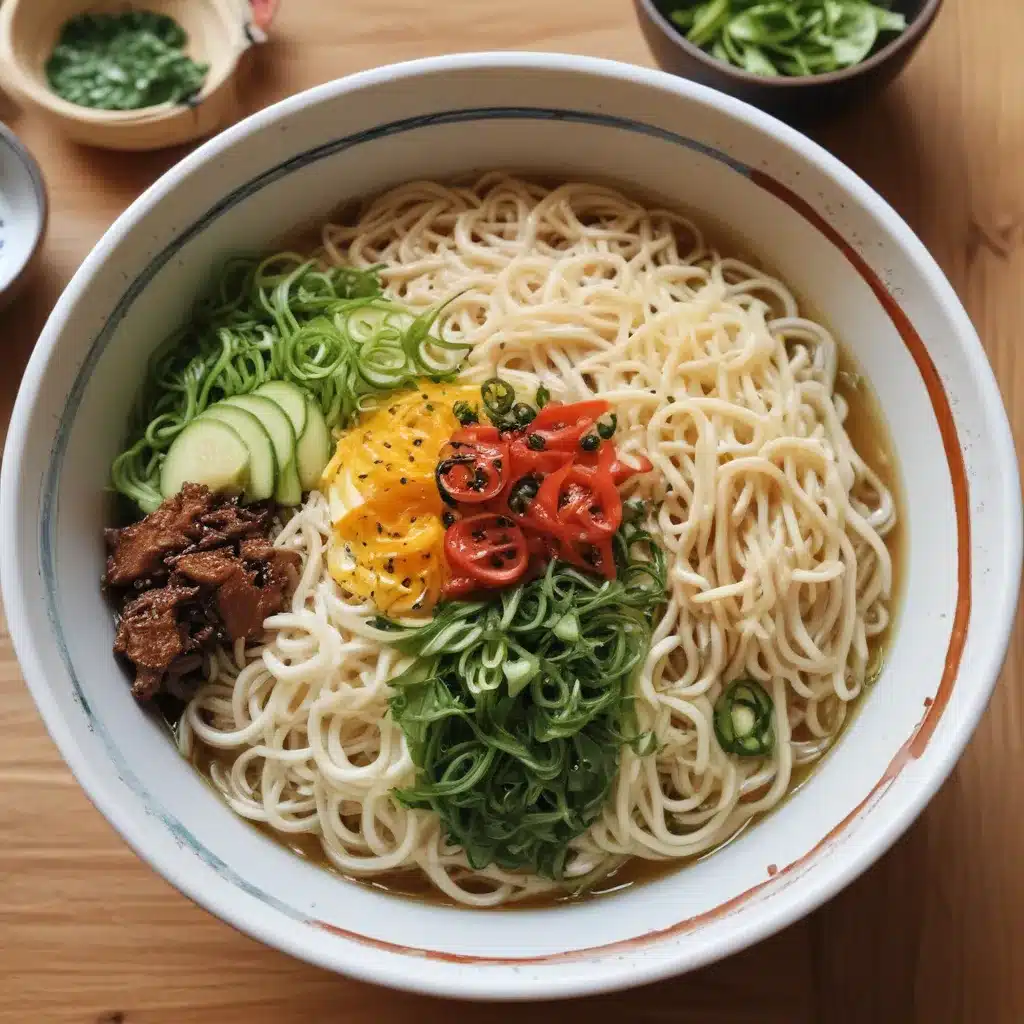
The Chilled Delight that Captivates Boston’s Palates
As the sun beats down on the bustling streets of Boston, the city’s culinary enthusiasts find solace in a centuries-old Korean delicacy – Kongguksu. This refreshing noodle dish, a summertime staple, has captured the hearts and taste buds of locals and visitors alike, offering a delightful respite from the sweltering heat.
I still remember the first time I encountered Kongguksu. It was a sultry summer day, and the thought of a steaming bowl of soup was enough to make me break out in a sweat. That is, until a friend suggested we venture to a quaint Korean restaurant tucked away in the heart of the city. As I stepped through the door, the aroma of toasted soybeans and fragrant herbs immediately whisked me away to a serene Korean garden.
Intrigued, I eagerly ordered the Kongguksu, not knowing what to expect. The first spoonful was a revelation – a harmonious blend of chilled soy milk broth, chewy noodles, and an array of vibrant garnishes that danced across my taste buds. It was a symphony of flavors, with each component playing its part in creating a symphony of refreshment.
Unraveling the Essence of Kongguksu
But what exactly is Kongguksu, and why has it become a summer staple in Boston’s culinary landscape? To understand this, we must delve into the rich history and cultural significance of this remarkable dish.
Kongguksu originates from the Joseon dynasty of Korea, a time when the peninsula was known for its agricultural prowess and culinary ingenuity. The dish was initially created as a way to utilize the abundance of soybeans harvested during the summer months. By blending the soybeans into a creamy, chilled broth and pairing it with delicate noodles, the Koreans crafted a refreshing and nourishing meal that could beat the heat.
The process of making Kongguksu is a labor of love, requiring patience and skill. First, the soybeans are meticulously soaked, boiled, and then blended into a smooth, milk-like liquid. This soy milk broth is then chilled to the perfect temperature, allowing the flavors to meld and the texture to become velvety smooth.
But the true magic of Kongguksu lies in its array of toppings and garnishes. Julienned cucumbers, fragrant sesame leaves, crunchy pine nuts, and a sprinkle of finely chopped green onions – each element adds a distinct texture and flavor that complements the chilled soy milk broth. It’s a harmonious dance of flavors and textures that truly elevates the dish.
A Culinary Oasis in the Heart of Boston
While Kongguksu may have its roots in Korea, the dish has found a passionate following among Boston’s diverse food community. Scattered throughout the city, a handful of Korean restaurants have mastered the art of crafting this summertime delight, each putting their own unique spin on the classic recipe.
One such establishment is Korean Garden Boston, a hidden gem tucked away in the bustling neighborhood of Back Bay. Here, the Kongguksu is prepared with the utmost care and attention to detail. The soy milk broth is made from scratch, using only the freshest, locally sourced soybeans, and the noodles are hand-pulled to achieve the perfect texture.
As I step through the doors of Korean Garden Boston, I’m immediately transported to a serene Korean oasis, complete with traditional décor and the gentle hum of conversations. The staff, well-versed in the nuances of Korean cuisine, are eager to guide diners through the menu, offering recommendations and insights that elevate the dining experience.
When the Kongguksu arrives at the table, it’s a sight to behold. The vibrant green garnishes, the glistening soy milk broth, and the perfectly al dente noodles all come together to create a visually stunning dish that’s almost too beautiful to eat. But as I take the first bite, I’m reminded why Kongguksu has become a summertime staple in Boston – the flavors are simply divine.
Embracing the Versatility of Kongguksu
One of the many charms of Kongguksu is its versatility. While the classic version is a delight in its own right, Boston’s Korean eateries have found innovative ways to put their own spin on the dish, catering to the diverse tastes of the city’s food enthusiasts.
At Korean Garden Boston, for instance, they offer a variety of Kongguksu options, each with its own unique twist. The traditional Kongguksu is joined by renditions featuring toppings like juicy shredded chicken, savory minced beef, or even a vegetarian-friendly version with sautéed mushrooms and tofu. The possibilities are endless, allowing diners to explore the depths of this chilled noodle dish.
But the real beauty of Kongguksu lies in its ability to be enjoyed year-round. While the dish is undoubtedly a summertime staple, many Korean restaurants in Boston have found ways to adapt it to suit the changing seasons. In the cooler months, the chilled soy milk broth can be transformed into a comforting, hot noodle soup, perfect for warming the soul on a chilly winter day.
A Culinary Journey through Korea
As I continue to explore the Kongguksu offerings in Boston, I can’t help but feel a deep connection to the rich culinary heritage of Korea. This humble dish, with its centuries-old roots, has become a cultural ambassador, bridging the gap between the Korean peninsula and the bustling streets of Boston.
Each spoonful of Kongguksu is a gateway to a Korea that is both familiar and foreign – a land of vibrant flavors, time-honored traditions, and a deep appreciation for the bounty of nature. It’s a culinary journey that transcends borders and brings people together, celebrating the universal language of good food.
Embracing the Chilled Delight of Kongguksu
So, the next time the summer heat bears down on Boston, I encourage you to seek out a delectable bowl of Kongguksu. Whether you find it at Korean Garden Boston or one of the city’s other Korean eateries, allow yourself to be transported to a serene Korean garden, where the chilled soy milk broth and the harmonious blend of garnishes will refresh and delight your senses.
Kongguksu is more than just a dish – it’s a culinary experience that celebrates the rich cultural heritage of Korea and the vibrant food scene of Boston. So, embrace the chilled delight of Kongguksu, and let it be your gateway to a world of flavors and culinary exploration.
